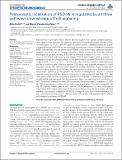| dc.contributor.author | Yoshii, Akira | |
| dc.contributor.author | Constantine-Paton, Martha | |
| dc.date.accessioned | 2014-06-23T16:55:56Z | |
| dc.date.available | 2014-06-23T16:55:56Z | |
| dc.date.issued | 2014-03 | |
| dc.date.submitted | 2014-01 | |
| dc.identifier.issn | 1663-3563 | |
| dc.identifier.uri | http://hdl.handle.net/1721.1/88066 | |
| dc.description.abstract | Brain-derived neurotrophic factor (BDNF) and its receptor TrkB regulate synaptic plasticity. TrkB triggers three downstream signaling pathways; Phosphatidylinositol 3-kinase (PI3K), Phospholipase Cγ (PLCγ) and Mitogen activated protein kinases/Extracellular signal-regulated kinases (MAPK/ERK). We previously showed two distinct mechanisms whereby BDNF-TrkB pathway controls trafficking of PSD-95, which is the major scaffold at excitatory synapses and is critical for synapse maturation. BDNF activates the PI3K-Akt pathway and regulates synaptic delivery of PSD-95 via vesicular transport (Yoshii and Constantine-Paton, 2007). BDNF-TrkB signaling also triggers PSD-95 palmitoylation and its transport to synapses through the phosphorylation of the palmitoylation enzyme ZDHHC8 by a protein kinase C (PKC; Yoshii et al., 2011). The second study used PKC inhibitors chelerythrine as well as a synthetic zeta inhibitory peptide (ZIP) which was originally designed to block the brain-specific PKC isoform protein kinase Mζ (PKMζ). However, recent studies raise concerns about specificity of ZIP. Here, we assessed the contribution of TrkB and its three downstream pathways to the synaptic distribution of endogenous PSD-95 in cultured neurons using chemical and genetic interventions. We confirmed that TrkB, PLC, and PI3K were critical for the postsynaptic distribution of PSD-95. Furthermore, suppression of MAPK/ERK also disrupted PSD-95 expression. Next, we examined the contribution of PKC. While both chelerythrine and ZIP suppressed the postsynaptic localization of PSD-95, RNA interference for PKMζ did not have a significant effect. This result suggests that the ZIP peptide, widely used as the “specific” PKMζ antagonist by many investigators may block a PKC variant other than PKMζ such as PKCλ/ι. Our results indicate that TrkB regulates postsynaptic localization of PSD-95 through all three downstream pathways, but also recommend further work to identify other PKC variants that regulate palmitoylation and synaptic localization of PSD-95. | en_US |
| dc.description.sponsorship | National Institutes of Health (U.S.) (NIH grant 5R01EY006039-27) | en_US |
| dc.description.sponsorship | National Institutes of Health (U.S.) (NIH grant 5R01EY01407415) | en_US |
| dc.language.iso | en_US | |
| dc.publisher | Frontiers Research Foundation | en_US |
| dc.relation.isversionof | http://dx.doi.org/10.3389/fnsyn.2014.00006 | en_US |
| dc.rights | Article is made available in accordance with the publisher's policy and may be subject to US copyright law. Please refer to the publisher's site for terms of use. | en_US |
| dc.source | Frontiers Research Foundation | en_US |
| dc.title | Postsynaptic localization of PSD-95 is regulated by all three pathways downstream of TrkB signaling | en_US |
| dc.type | Article | en_US |
| dc.identifier.citation | Yoshii, Akira, and Martha Constantine-Paton. “Postsynaptic Localization of PSD-95 Is Regulated by All Three Pathways Downstream of TrkB Signaling.” Frontiers in Synaptic Neuroscience 6 (March 31, 2014). | en_US |
| dc.contributor.department | Massachusetts Institute of Technology. Department of Brain and Cognitive Sciences | en_US |
| dc.contributor.department | McGovern Institute for Brain Research at MIT | en_US |
| dc.contributor.mitauthor | Yoshii, Akira | en_US |
| dc.contributor.mitauthor | Constantine-Paton, Martha | en_US |
| dc.relation.journal | Frontiers in Synaptic Neuroscience | en_US |
| dc.eprint.version | Final published version | en_US |
| dc.type.uri | http://purl.org/eprint/type/JournalArticle | en_US |
| eprint.status | http://purl.org/eprint/status/PeerReviewed | en_US |
| dspace.orderedauthors | Yoshii, Akira; Constantine-Paton, Martha | en_US |
| dc.identifier.orcid | https://orcid.org/0000-0003-2268-0863 | |
| mit.license | PUBLISHER_POLICY | en_US |
| mit.metadata.status | Complete | |
